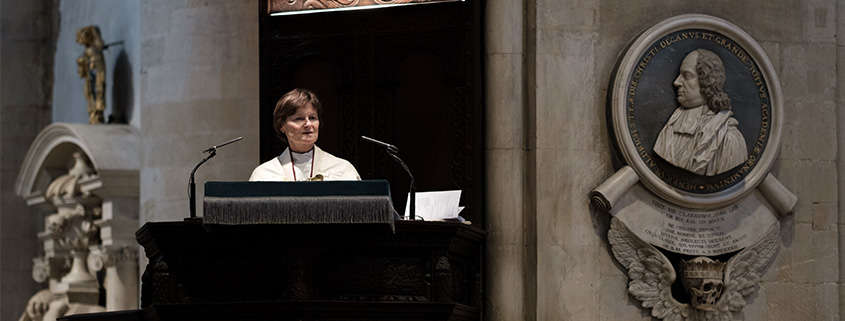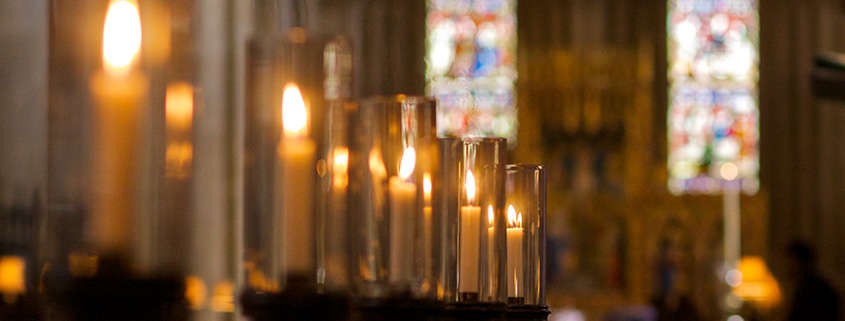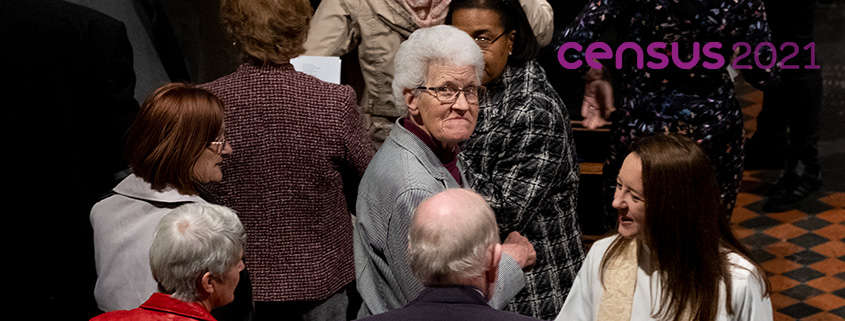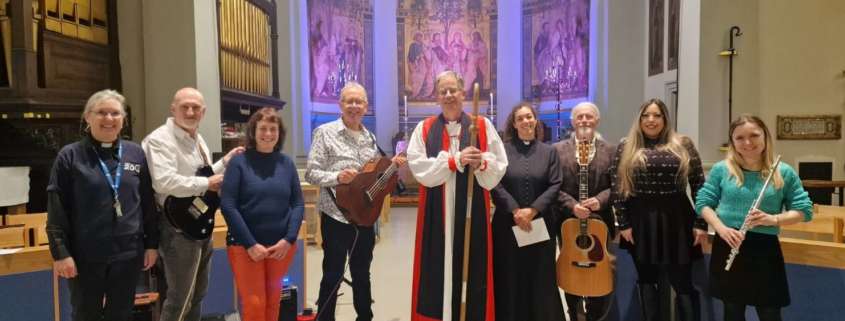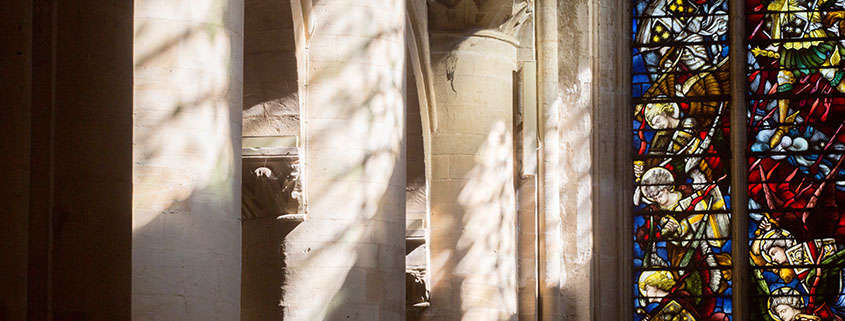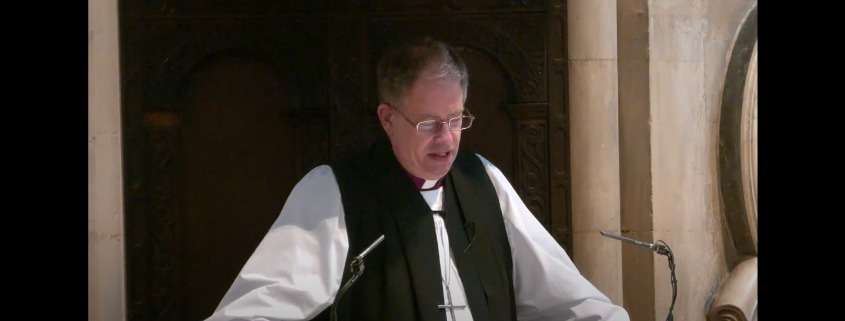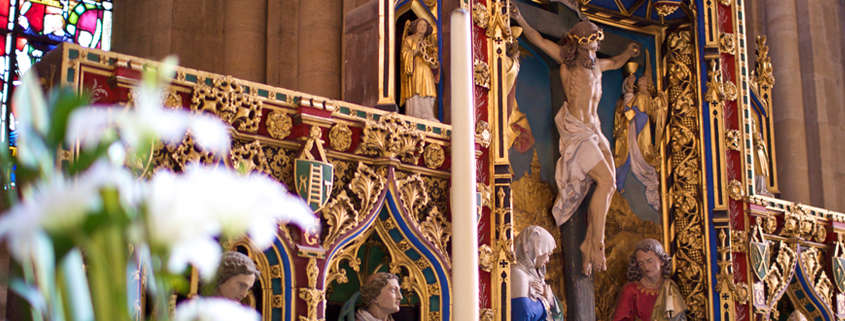The Bishop of Reading, the Rt Revd. Olivia Graham, gave the sermon at the Eucharist with the Blessing of Oils and Renewal of Ministerial Commitment at Christ Church Cathedral, Oxford, on Maundy Thursday this year.
Today, we gather to remember God’s grace and his love in Jesus Christ; to renew our call to ministry; and to worship the Lord in the beauty of holiness. Today in this beautiful and ancient space, we are glad to gather and look around at each other and marvel at what God has done and continues to do in our lives.
The oils that we bless today are a sign of the power of the Holy Spirit at work in our lives. They are a reminder of the grace and the blessings that God has given to us through the sacraments, and they remind us of our calling as baptised Christians to share that grace and blessing with others.
And as we renew our ministerial commitment, our thoughts are naturally drawn to reflecting on our calling to ministry in God’s church. What is it to be called and how can we encourage others to think about it as a normal part of our relationship with God?
It has come to us in many ways. It might have been that we felt a niggle, experienced a thought that wouldn’t not go away, sensed a nudge. It might be that a word that kept coming back to us, or a series of ‘co-incidences’ took place which triggered us to wonder whether something was going on. It have might been the ‘have you ever thought about?’ question, asked by one person, and then maybe repeated in some form by others. Other people often see in us what we can’t see in ourselves, notice the gifts we have been given, or the way our hearts are inclined. And maybe it was none of those things, but simply an experience of getting more and more drawn in until it seemed like a natural next step.
Just occasionally it is a voice. Maybe God’s, maybe our own. My own sense of calling began a decade before I was ordained. I was working for Oxfam in Somalia., One hot sticky night, during a routing power cut and by the light of a pressure lamp, I sitting with an oddly assorted group of people who were doing the same kind of work as I was, we began to tell each other what we thought we would be doing in 10 years time. When it got to me, I heard a voice saying ‘I think I will be ordained’. To this day I don’t know where it came from. It was my voice, but not my words, because I had never voiced this idea, had never even formed the thought in my head. But sure enough, 10 years later, I was ordained in this Cathedral.
We will all have a story to tell of how we were called into the flow of the Kingdom of God.
Imagine perhaps a stream emerging from a dark, underground, invisible place and flowing out into the daylight, through woodland; a stream contained by banks down which leaves and twigs tumble and are swept along in the flow. Each of us who becomes conscious of God’s call on our lives, at that moment tumbles into the stream and is carried along by it. It has no beginning and no end, although we experience the passage of time and the sense of a journey. Our journey is unique, but it’s in company with others, and born along by the irresistible current of God’s eternal love.
Christ walks the earth among us, calling, calling, who will go for us and whom shall we send? At some point we have said ‘Speak, for we are listening. Here I am, send me’. And we have tumbled into the stream, and begun a journey of discovery.
What we discover is the part we are called to play in God’s Church and God’s world as we witness to God’s wonderful story of salvation through Christ; as God continues to forge his relationship of love with the creation.
Vocation, for all of us, begins with getting to know ourselves. The quest to gain an ever greater understanding of who we are, is one which should underpin our lives, and this has been recognised from ancient, pre-Christian times. The great message of the Oracle at Delphi was Know Thyself. It’s a lifelong quest well known to secular philosophy and psychology.
But for us as Christian disciples, vocation begins with knowing our belovedness in God’s eyes and God’s heart, and becoming aware of who God intends us to be. This entails growing in holiness and becoming more Christ like. We are who we are, and all that we are, in Christ, who is our beginning and our end.
But it will also entail shaping our lives in a particular way for a particular purpose. And when we discover, by whatever means, a course for our life which is the right fit, then we have a sense of ‘Yes, this is who I am; this is what I am for’. And we experience a sense of the rightness of it. In Christ, fully in Christ, we are a new creation – the old has gone, the new is come.
We are here today, in this Cathedral, because we have heard the voice of this calling in the Church of England. We may have always been in the CofE; we may have joined it at some stage, and there may have been a moment of decision when we said, OK I’m in.
We’re here because we’re committed to this imperfect, sometimes confusing, sometimes troubled expression of the Body of Christ; because it feels like home. It’s often infuriating and slow; it’s often fractured; it can be bad-tempered. It emerged out of a King’s marital difficulties nearly 500 years ago; it was founded in statecraft and pragmatism, on differences held in tension, and reconciled disagreement; it is underpinned by historic formularies; governed by Canons and Measures and served by the ordering of Bishops, Priests and Deacons as well as lay people in licensed ministries. It is a big, complicated old thing. And within it, and the ministry it offers, there are abundant moments and examples of real holiness, humility and self-giving love, as God-filled Christians incarnate the Christ of the Beatitudes, and through the astonishing reach of the CofE into all corners of our society and nation, tend and serve and love human beings in every kind of need, and proclaim the good news of Jesus Christ.
Why me? Why any of us? Simon Peter, when brought face to face with the realisation of who Jesus was through the miraculous catch of fish (in Luke 5) fell on his knees and said, Go away from me Lord, for I am a sinful man.
Who among us is not? We’re all horrible, miserable sinners. We get it wrong daily, hourly. We judge, and misjudge, and fail to love and show compassion, and think we know best. We are hard of heart, and we lack hospitality and generosity; we mis-use power. But the gospel story in Luke 7 gives us hope. The irony of this story of course is that the woman, who is introduced as ‘a sinner’, makes her extraordinary display of love and contrition, and is forgiven. But Jesus makes it clear that Simon the Pharisee, who is quick to label and condemn her, is no less a sinner, perhaps the more so because he does not recognise it; and his lack of love stands in sharp contrast to the woman’s extravagant display.
Simon thinks of himself as a good man. He is an alpha male; he is a Pharisee, an influential religious leader. He has power and status (and frankly, thinks that Jesus is in a lower class). He thinks of his life as being correct and feels justified in taking the moral high ground. The woman with no name is outcast, with sexual sin implied – probably that of selling her body to satisfy the market for sex without responsibility demanded by her male clientele, and repeated down the centuries. Who knows why she does it? Maybe she is forced into it; maybe she just needs to eat or support her children. She has no power or status; and she is labelled by a hypocritical religious elite. A sinner.
When we recognise how much we have all fallen short, and turn back to God with love and longing in our hearts, we are forgiven. In the face of love, there is no moral high ground. We are astonishingly equalised, and forgiven in the measure that we love. And as we are forgiven, we are made worthy – as the Eucharistic prayer puts it – to stand in your presence and serve you.
And this is the only way that we can be credible ministers of the Gospel.
Today, conscious of our failings, conscious that we dare not judge others, we renew our commitment as ministers of the gospel, to God and to one another. Tomorrow is Good Friday: when the body of Christ is broken for each one of us on the Cross. And beyond it lies Easter Day. And with that front and centre, let’s remember our calling to be ministers of hope, of faith, of love. In the service of Jesus Christ.

